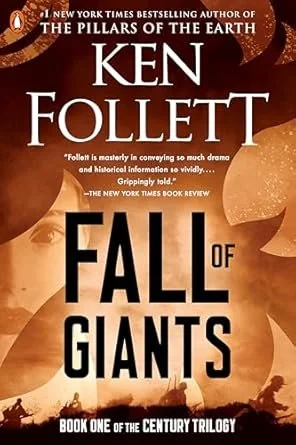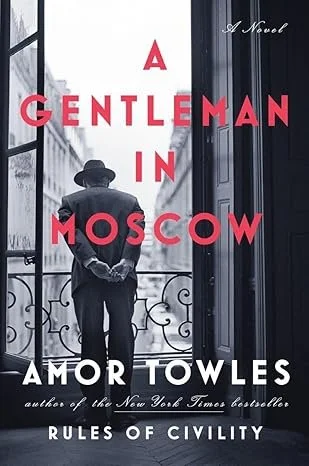Five Immersive Historical Fiction Novels
From the time I was a young girl, I have always loved historical fiction. I remember joyfully working my way through the American Girl series as a kid and later moving onto the Dear America series around fourth or fifth grade. These became regular checkouts for me from my weekly school library visits. Historical fiction has a unique way of pulling you into another world that feels at once foreign and real. Sometimes I read a novel that makes me want to dive into the history of a specific place and time I knew little about before I read it. Other times I know a lot about the time and place, but I begin to see how different people living in that time and place might have viewed the world in a clearer way. The novels featured in this post have all immersed me in the worlds the authors created, and I hope you will read and love them all as much as I did.
Fall of Giants is one of my favorite books of all time. I have gifted it countless times to others, especially to the men in my life. Ken Follett has a masterful way of fully developing separate storylines that intertwine beautifully to depict a specific era from multiple points of view. This book is the first in his century trilogy. All three are wonderful reads, but this one kicks off the series with a bang. Set during the days leading up to and including World War I, characters across Europe and the United States experience a time of truly unprecedented change. Follett gives the reader a front row seat. Don’t be intimidated by the length and breadth of the book. Every detail is carefully chosen and clearly propels the story forward, making it an engaging read from start to finish.
This one is as great a read for fans of Downton Abbey as it is for fans of Band of Brothers. (Yes, I know Band of Brothers is about World War II.) Realistic, complex characters, straightforward prose, and epic storylines all contribute to making this one of my favorite historical fiction novels. Writing this post, I honestly can’t wait to reread the whole series.
You’ve probably at least heard of, if not read, this book. It has sold more than 2 million copies, and everyone I know who loves to read was reading it pretty much as soon as it came out. I LOVE Amor Towles’s writing. His first novel The Rules of Civility is one of my all time favorite books, so I was excited to read this one that it seemed like the whole world was falling in love with. I have to say this book was a slow burn for me. I do love it (hence why it appears on this list), but I had to get past some things first. When I first dove into this world, I found myself feeling irritated by Count Rostov (the protagonist). He was so cultured that reading his thoughts and words made me feel uncultured. This was very much a first for me, and I did not appreciate the feeling. I set the book down for a few days feeling annoyed. Then I remembered something essential. Great literature grows us. It is good for me to feel uncultured or inferior because it gives me motivation to grow. I also have a feeling that had I ever had the opportunity to meet a true Russian aristocrat from the time of the novel, I would indeed have felt extremely uncultured by comparison.
Amor Towles writes with such a distinct style and voice. His plots propel the story and the reader forward with each page. His characters vividly live on in my imagination long after I close his novels. A Gentleman in Moscow at once gives light to post-revolution Russia and our American society today. This book is epic in story and scale and reminded me of Victor Hugo’s Les Miserables (another favorite of mine) for that reason.
Oh, how I love The Light Between Oceans. I read this book when it was published in 2012, and it has stayed with me ever since. Set in Australia in 1926, this story follows Tom Sherbourne, a man who has returned from fighting on the Western front in World War I to live an isolated life as a lighthouse keeper and his wife Isabel. Isabel, already physically isolated from the world, experiences two miscarriages and a stillbirth. When a dead man and a living baby show up on the beach, she determines to make the child her own. The rest of the novel follows Tom, Isabel, and their daughter as the repercussions of that decision ripple through time and space.
This is a beautifully written and developed story that reminds us of all the gray areas we experience as humans in life—the way one person’s salvation can be another’s downfall. This is a great read for anyone who is willing to let themselves feel deeply or who has ever wondered at the complicated nature of human decision making.
I can thank my own book club for introducing me to this beautiful book. It is the story of Sarah Grimke, a Charleston-raised daughter of a slave owning family in the nineteenth century, and Hetty ‘Handful’ Grimke, who is gifted to Sarah as her own slave on her eleventh birthday. The story is told from each of their points of view, and these women are so remarkably well-developed in the novel that each one’s voice rings clear through their telling of their stories. Both characters are impressive in their own right, and both characters are women of their time.
One of my favorite things about this novel is that Sue Monk Kidd does not shy away from the horrors of slavery. There is no white-washing to be found. Seeing this historically accurate world from both women’s perspectives makes the reader wonder at the inhumanity of the human race. Somehow, amid the backdrop of so much evil, these characters (and therefore the reader) still find some hope. The Invention of Wings can be a tough read at times because it is based on true, terrible history, but it is worth every second living in that world to ensure that we as humans do not repeat the mistakes of our past.
The Nightingale is the first of Kristin Hannah’s novels that I ever read. I have since read many more. It is the sweeping, epic tale of Vianne Mauriac, a calm, steady wife and mother living in the French countryside on the cusp of World War II and her younger, rebellious sister Isabelle, who falls in love with a partisan named Gaetan and later joins the French Resistance. The contrast between these sisters enables any reader to immerse themselves in this world. In some way or another, you will be able to relate to one of them and therefore feel their experiences more deeply.
Kiristin Hannah has a way of writing fiction that is both page-turning and character-driven, and this book is no exception. I honestly can’t think of a single person I wouldn’t recommend this book to. If you haven’t read it yet, do yourself a favor and add it to your read next list. Just be prepared to be crying by the end.
This post may contain affiliate links. If you click on a link and make a purchase, I may make a small commission. Thank you for supporting the blog.
Like what you see? Subscribe to my email list, and never miss a post!





